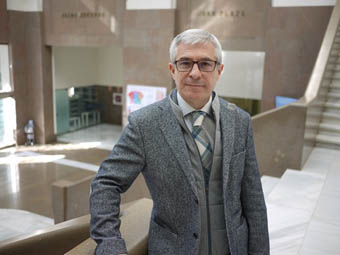
Middle-aged Valencian women participate in Focus, a European project led by the Universitat de València with a €2,4 millions budget whose objective is to rise European Union’s life expectancy in two years for the following decade as well as improving the ageing process’ quality and creating the first fragility map within the community scope.
The project is coordinated by the Universitat de València thanks to the Full University Professor in the Department of Paediatrics, Obstetrics and Gynaecology Antonio Cano, also chief of service in his specialty at the Hospital Clínico Universitario (University Clinical Hospital). Since 2015, nine groups participate in this proposal from Great Britain, Netherlands, Spain, Portugal, Poland and Italy which includes several universities. The global objective is to acknowledge and identify factors which allow a management of the elder’s fragility and to promote life habits focused on a healthy ageing.
From Valencia, an innovative strategy is being developed and counts with the participation of middle-age women in a programme of physical activity in order to evaluate its impact in a series of aspects such as cognition and mood, life quality or bone health. Fragility, usually linked to advanced ages and studied from different scopes. also holds a gender profile. “Several researches have found a greater prevalence of fragility in women”, stated Antonio Cano.
“This experience is resorting in a technological focus so that women who use apps perform better at the programme, which is the main limitation in most experiences on physical activity around the world”, said Antonio Cano, who completed this highlighting that the project is “being a very interesting activity, as many women have discovered how technology can help them change their life”.
In the Valencian case, the project’s development is under the charge of volunteers and has been supported by Salus Vitae, an NGO which has collaborated with a course to sow the basic aspects related to informatics and the Internet.
The Focus project,optimization of the management of fragility through good EIPAHA practices and the participation of groups of interest, has been design to make the most of the different entities tackling fragility within the frame of the European Innovation Partnership for Active and Healthy Ageing (EIPAHA). This entity, an initiative by the European Commission, aspires to rise in two years European’s life expectancy in good quality conditions for the year 2020.
Focus is 60% financed by the third programme on Health by the European Union and managed by the Consumers, Health, Agriculture and Food Executive Agency (CHAFEA) With this programme, Europe intends to lead innovation in this field so that older people, with the improvement of their health conditions, may conform the substrate of the so-called ‘silvereconomy’ (elderly people’s economy) Ageing would became an opportunity and not a burden. This would increase health system sustainability and it would be a source of employment and wealth.
Within the framework of the Focus project, a research team led by Carol Holland from Aston University, have been going through the existing literature to generate a balanced conceptualization of fragility. The work will be published in specialized magazines and it is almost completed.
Universities and participating groups in Focus are: Boston University (United Kingdom), Uniwersytet Medyczny im Piastow Slaskich we Wroclawiu (Poland), Universidade de Aveiro (Portugal), Escuela Superior de Enfermagem de Coimbra (Portugal). Other participants are: research centres (Roessingh Research and Development BV, Netherlands), Fondazione IRCCS Ca ‘Granda-Ospedale Maggiore Policlinico (Italy), Istituto di Ricerche Farmacologiche Mario Negri (Italy), and also companies such as Everis Spain and Estudios de Software Avanzado y Mantenimiento de Tecnología (Advanced Software Studies and Maintenance of Technology), this lat one is a Universitat de València ‘spin-off’ which participates in the impact analysis in the various social agents.
Fragility
Fragility and ageing is a global phenomenon that generates new challenges for Medicine. It is associated with chronic diseases of aging and with a higher number of hospitalisations or dependency, besides death. In this new scenario in health service, fragility prevention or delay has become a subject of study, given that puts people in a situation of vulnerability for their mental and physical health. Physical activity, acquisition of healthy sleeping, rest and nutrition habits or the participation in social activities are recommended for reducing its impact.
Trajectory
Antonio Cano Sánchez is Full University Professor in Obstetrics and Gynaecology and also chief of service in his specialty at the Hospital Clínico Universitario (University Clinical Hospital). Furthermore, he directs the Master’s Degree in Human Reproduction. His main interest is the gynaecological endocrinology. He is the author of several books and national and international articles, Gynaecological publisher in the journal ‘European Journl of Obstetrics, Gynecology and Reproductive Biology’; and associate editor of the ‘Gynecologic and Obstetric Investigation’. He leads a research team that works in the involvement of hormones in areas such as osteoporosis, breast or cardiovascular system.
Last update: 26 de may de 2016 11:16.
News release


















